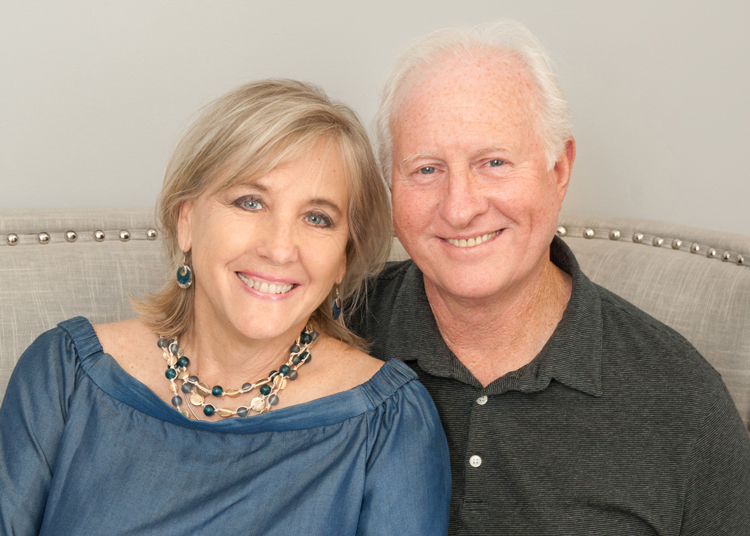
Bill and Mary Buckley
FCA’s Dynamic Duo
Bill Buckley took the reins as the State Director of Mississippi Fellowship of Christian Athletes this past May. With his wife Mary, who has also been an FCA staffer for more than a decade, they bring amazing and unusually relevant gifts to a ministry that keeps a close watch on our secular culture and the ever-changing challenges that compete with the gospel for the lives and hearts of coaches and athletes on every level.
They were hippies—Mississippi style—back in 1973. Mary Parker was a very pretty and very easygoing sorority girl from Pickens, Mississippi—or make that “out from Pickens.” She liked to have fun and thought Bill Buckley was about the most fun guy she had ever met.
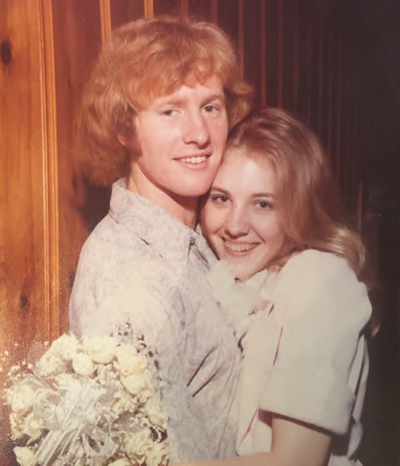
Bill and Mary married between semesters of their junior year at MSU.
Bill Buckley liked to have fun, but he was also pretty serious about his football. He was the star receiver on the not-so-successful Mississippi State Bulldog football team of the time. He led the entire SEC in receptions in 1972 and 1973. He had such potential.
Considering that he was heavily recruited by legendary coaches like Bear Bryant at Alabama, Frank Broyles at the University of Arkansas, and Auburn’s Ralph Jordan, it seems a little puzzling that he chose the team that was always the underdog compared to the teams that were winning titles and going to bowl games. This was an era where there were far fewer bowls in contention. The Big Ten dominated. Alabama was the only SEC team that was a consistent contender for a national title.
Even so, Bill Buckley chose Mississippi State. Starkville native, loyal to the core—he is still a Bulldog through and through. His story is one of the very best testimonies ever to the reality of Jeremiah 29:11, “ For I know the plans I have for you,” declares the Lord, “plans to prosper you and not to harm you, plans to give you hope and a future.”
If he had chosen any place other than MSU, he would have missed Mary Parker, and that would have been a travesty.
A Good Southern Upbringing
Mary and Bill shared a similar upbringing. In those days, in the middle of the Bible Belt, all families belonged to a church and were regular attendees. At least the Buckleys of Longview, Mississippi, and the Parkers of Pickens were.
It’s just amazing how everything can look so right from the outside but not be really right at all.
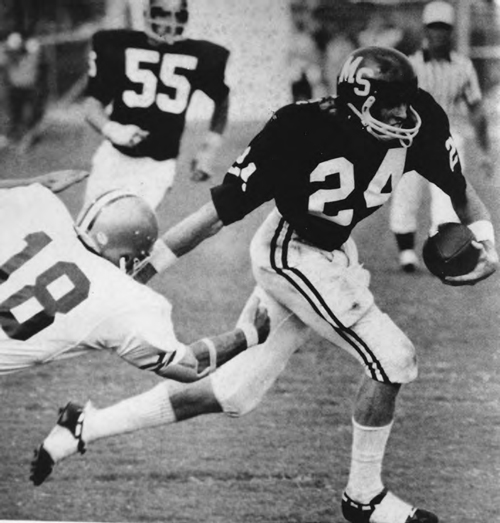
Bill led the entire SEC in 1972 and 1973 in total receptions. The truth was his entire self-worth and identity was wrapped up in #24.
Bill’s entire identity and worth were wrapped up in football. He wore the number 24 from the time he played his first organized football game in seventh grade. That did not change right through his career at MSU.
Bill’s dad would come to his bedroom every night and pray with him. He loved and respected his father. But either nobody ever explained or Bill was not listening when it came to that “Christianese” thing about “a personal relationship with Jesus.” He really wanted just enough Jesus to be sure he made it to heaven but not so much that he had to change the way he was living.
“Being a Christian was more about ‘do these things,’ and ‘don’t do these things,” and nobody talked about purpose, especially the purpose God had for me. Nobody told me about that. And I didn’t see anybody at church having any fun. I could see that there were people there who were serious about what they were doing—they were committed—but as a young guy, I couldn’t see why anybody was into all of that.”
Mary adds in ditto, “You have to give up everything you love and everything you’re passionate about.” That was the message she interpreted.
And so these two pretty much went through the motions.
“We were both exploring and getting into things we shouldn’t have and wished a million times we hadn’t,” Mary says.
They both say, however, that God seemed to have His hand on them even when they weren’t too interested in Him. They married in the middle of their junior year at MSU, and they had absolutely no idea what marriage was about beyond, “We’re in love and now we are going to live happily ever after.”
But regular life was a lot more complicated than they realized.
And Then…
The New York Jets drafted Bill in the 11th round. He was their first choice for wide receiver. The Buckleys headed to Hempstead, Rhode Island, for training camp. This was during the times Joe Namath was making headlines—and not always about football. It was likely a pretty heady experience for a guy from Starkville, Mississippi.
Bill had developed a few unhealthy habits by this time. The pressures of achieving in football had taken over his initial enthusiasm for the game itself. Football was no longer the thing he simply loved because he did it well, but it was his entire identity, and his performance defined his entire worth as an individual. He had begun smoking pot as a way to escape, to calm down, to stop worrying—all of the above and more. He smoked daily to make it through.
Bill says, “I was living terrible. I wasn’t taking care of myself physically. I walked out the door at MS State and I was on my own. I got to training camp. I didn’t get stronger. I didn’t get faster. I quit progressing which is something I had done my whole life.”
The dream of the start-to-finish career, the very golden dream he had carried in his heart since he was about six years old, was not happening. And Bill Buckley, super star, did not have the inner resources (i.e. the faith factor) to deal with this disappointment.
He says, “You know, when you carry a dream and a passion for a dream, you can only carry it so long without God. Sooner or later the thing that brought you lightness is going to bring you heaviness, and that’s exactly what happened to me. I couldn’t carry it. The dream I had had all my life to play football and do great at every level got to be too heavy. I think that’s what big dreams are— they’re bigger than you if it’s really God. You can’t carry them in your own strength. They get depressing. And that’s what happened to me.”
 Bill needed relief from the pressure, and so he turned to alcohol first and then to drugs—marijuana. The irony is that the very thing that made him less anxious about football greatly impeded his ability to perform in the arena he loved—football.
Bill needed relief from the pressure, and so he turned to alcohol first and then to drugs—marijuana. The irony is that the very thing that made him less anxious about football greatly impeded his ability to perform in the arena he loved—football.
And so, not surprisingly, he got cut. As he sat in the office that day listening to the coach who was tasked with delivering the news Bill dreaded, his number one thought was not, “I am upset over the loss of this dream.” Instead, he thought, “Gee, I hope I have enough marijuana to get me through this disappointment.”
He was immediately picked up by the New England Patriots, and the ever-resilient Mary Parker Buckley packed up their meager belongings and climbed into the car with her husband en route to the Patriots training facility.
Actually, they were both still in 1970s flower child mode.
Bill was really a mess. He was tired of the stress. He was depressed, and he felt no drive or enthusiasm to try. Halfway to their destination Bill pulled the car over and said, “Mary, I’m done. I just don’t have anything else to give to football.”
Mary said, “Okay.”
As if this were a normal conversation about nothing important, Bill said, “Well, where do you want to go?”
She said, “Oh, I don’t know. What about Dallas?”
With no plan, no job, no place to live, no sense of, “This might be a bit irresponsible,” they moved to Dallas.
A Road Back
They shopped the classifieds for employment. Nothing was really coming together when MSU’s Coach Bob Tyler called Bill and invited him to come back to State, take a position as a graduate assistant, and help him with the football program. Tyler had coached Bill his last two years and had always thought highly of him. He had no idea about the drug habit or the inner struggles.
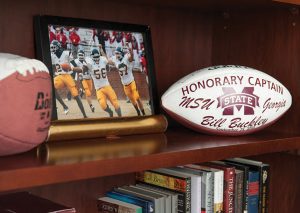 Bill took the job, but it was grueling. Before the digital world changed the way coaches receive and review game film, the film was produced off campus, sometimes out of state. One of Bill’s duties was to pick up the film every Sunday morning and get it back to MSU within a few hours so the coaches could watch it on Sunday afternoon. There were really no days off, and Bill rarely saw Mary.
Bill took the job, but it was grueling. Before the digital world changed the way coaches receive and review game film, the film was produced off campus, sometimes out of state. One of Bill’s duties was to pick up the film every Sunday morning and get it back to MSU within a few hours so the coaches could watch it on Sunday afternoon. There were really no days off, and Bill rarely saw Mary.
Maybe the road back to sanity began the day he decided he and Mary could have a marriage or he could coach, but it was not going to be possible to do both at the same time.
Mary’s father knew they were struggling. Without swooping in to rescue them, he offered Bill a job and a place to live. It was a lifeline at the time, but Bill also saw his father-in-law’s generosity as a reality call that said, “You are not succeeding.”

Mary did not take up painting until she was past 40. Her mother’s daughter, Mary’s work is shown in several galleries around the state.
He calls himself “a broken man” at that time. He was hanging sheetrock in HUD housing, driving backhoes and heavy equipment. This was not the life he had envisioned for number 24. The MSU football star and Mr. Mississippi State University was looking an awful lot like the Prodigal Son who came to his senses in the pig pen one day.
But Bill Buckley was not quite there yet.
He was now the father of two daughters born 16 months apart, but he was floundering.
Becoming a mother was a very sobering experience for Mary. When her sister invited her to a weekly women’s Bible study, she went discovering a hunger she had not had before. She knew God was wooing her back to him.
One evening she went outside in a field beside their home and prayed, “Lord, I feel you calling me back, but I have got to have something more than I had before because that didn’t hold me. I need a big dose of you!”
And then, as is often the case, things got a little worse before they got better. Bill was still smoking pot every day.
When Mary confronted him telling him she greatly resented his spending their money on his drug habit, Bill did feel appropriately guilty. But his solution was to simply buy a few marijuana plants and grow his own weed. He couldn’t imagine giving it up.
Surrender
However, Bill noticed that something about Mary was changing. She wasn’t holier-than-thou; she didn’t nag him about his choices. In fact, he was really drawn to that calmness, peace, and her passion for the Lord. He did not completely understand it, but he knew he wanted it.
Bill came home one afternoon, pulled up all the marijuana plants, destroyed them and prayed—or at least said out loud, “Lord, I don’t even know if you are real, but I’m willing to find out.” Lightning did not strike and the sea did not part. He wasn’t suddenly the happy Christian he had hoped he might become in an instant, but he persevered in the search for the Lord and did not turn around and head back into the lifestyle he had already found to be very, very empty.
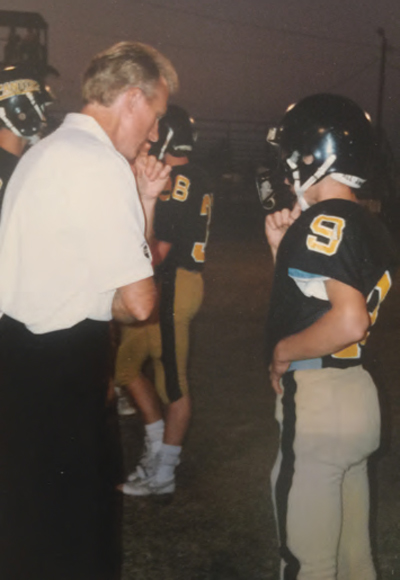
Bill is in his element when he is coaching football. Here he is with the Canton Academy Junior High team where his son, John Paul, played years ago.
Bill and Mary discovered a small congregation called Grace Church on West Briarwood Drive in Jackson. It had its origin in the Charismatic Pentecostal movement of the late 60s and early 70s. Bill says, “It was outside the realm of denominational traditional faith, but we were part of that. We were born again into that.”
There were some older couples at Grace who took the Buckleys under their wing, mentored them, loved them, and put Bill to work in an industrial cleaning business. Both Bill and Mary were almost totally immersed in seeking God on a deep level for the next several years.
Bill sees that time as similar to God taking Moses into the wilderness for a while. It was a complete break from all contact with football. He did not even watch games on television during that time. “I know now that was when the Lord was establishing my identity outside of number 24.”
At the end of those seven years, Mary and Bill felt called to help other people get out of the “ruts” of life in the same way those friends at Grace Church had helped them.
Maybe there was just a touch of that hippie wanderlust left in both of them because they decided to enroll at Elim Bible Institute in Lima, New York.
Finding That Sweet Spot
It took Bill four years to complete his studies at Elim. The first year he supported his family through odd jobs, one of which was sweeping out chimneys. The second year he was hired by a local high school as athletic director and soccer coach. As Mary says, “This was sort of our entry back into sports.” Sports, however, no longer held that idolatrous place in his life.
By the way, the first soccer game Bill ever saw was also the first one he coached. His team won their division that year.
Mary took classes, too, when she could, and she did some women’s ministry work along the way. Her focus, however, was, as it has always been, keeping the home front peaceful so that Bill could do what God had called him to do. “I was always proud to do that,” she says. “For me, it never felt like a sacrifice.”
Despite the call to seminary and the passion they both felt about it, they weren’t clear on the actual vocation to which they were called. Bill just assumed that Bible College meant pastoring, but when he took his first church, he quickly felt like a square peg in a round hole. He calls himself, “A horrible pastor! I was so NOT called to be a pastor. I lacked the patience and the gentleness. I would stand up in front of my congregation and want to say, ‘Will you people just get your lives together?’”
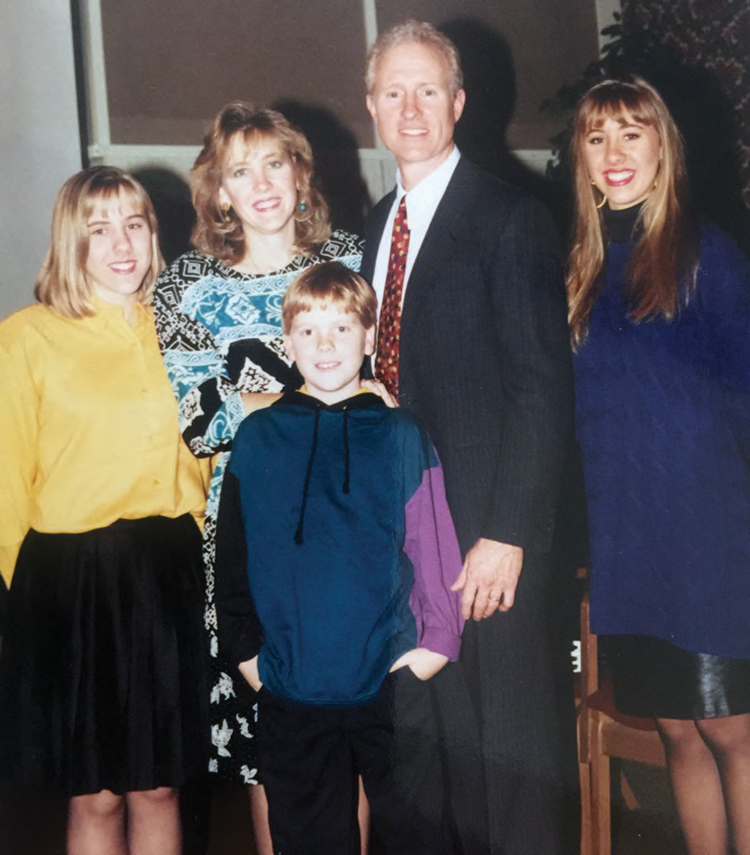
The Buckley family before the nest was empty! Left to right: Liza, Mary, John Paul, Bill, and Carrie.
Meanwhile back in Mississippi, his old Starkville friend, the late Bill Buckner, was growing the Fellowship of Christian Athletes ministry and was relentless in trying to convince him to come to work with him. Bill Buckner, with his gentle Southern drawl, kept inviting Bill Buckley down to speak at different events and each time, put the persuasive rush on him. “He just wore me down,” says Bill. It was just harder and harder to say “no” to Bill Buckner. And for that, Bill Buckley is extremely thankful.
FCA was the perfect place for Bill Buckley’s gifts.
Bill and Mary came back to Mississippi in 1995, and for ten years Bill worked as an area representative in central Mississippi. The ministry was growing, but the small staff zigzagged the state—recruiting volunteers, raising funds, mentoring coaches, establishing huddles, and expending superhuman effort at both individual and family ministry. Nobody would take such a job unless God was providing the passion and the energy.
And clearly, God did so then and still does.
Although Mary still spent most of her time being a wife and mom, as their children began to leave the nest, she was finding new opportunities to use the things she had learned at Elim Bible Institute also. For several years, she served as chaplain at Hospice Ministries in Ridgeland.
She also discovered a great talent she had not recognized before—Mary began painting. Her mother, Anne Parker, had been an accomplished artist whose work was shown in galleries, but Mary just never picked up a paintbrush until her nest was empty and the thought occurred to her she might enjoy drawing. She has developed her own reputation now as a Mississippi treasure. Her work can be found at Southern Breeze Gallery in Ridgeland, The Mill in Starkville, and Caron Gallery in Tupelo.
God seemed to increasingly open doors where Mary and Bill were giving time to share the gospel or to just be a loving presence with someone who was needy. They had become a ministry team either by chance or design. Did that impact their family dynamic?
Liza Buckley Young recalls that it was sometimes difficult to share them. “My parents have ministered to thousands of teens and young adults over the years, many of whom looked up to them like parents. I never felt less love from them, just jealousy over seeing other teens receive love from them too. This jealousy phase didn’t last very long. In fact, it ended one night at a camp my parents were speaking at when another teen came to me and told me, with tears in her eyes, what it meant for her to have my parents in her life and she thanked me for sharing them with her. After seeing how much it meant to her I only felt amazing joy in sharing my parents with everyone.”
And Just Like That
And then, August 29, 2005, came. Remember that hurricane named Katrina?
Bill and Mary went down to the coast almost as soon as the roads were open. They went as an FCA presence short term to see if they could help in the schools that had been, like everything else, almost obliterated.

“Papa” is a favorite role. Mary and Bill have 11 grandchildren!
That 1970s flower-child flexibility was again a positive as they quickly assessed the enormity of the need and realized this would not be a one or two-week assignment. They stayed for three years, and as Bill says, “We were busy all day, every day for all three years.”
There was a deluge of willing volunteers who flocked to the coast from all over the United States. The suddenness of the hurricane and the unpreparedness of every relief agency in proximity meant that there were great chaos and little organization in the beginning. Bill and Mary, through the FCA network, were able to equip teams, provide the tools, and the plan for specific tasks. They became a two-person clearinghouse. It was long and hard, but the experience of being part of that body of Christ doing what the body of Christ is designed to do left them with lasting relationships and an even deeper devotion to God than they had shared before.
And just an FYI that proved to be a kind of God-wink, Gulf Coast Community College convinced Bill to be their football coach while he was there. It was an unexpected opportunity to again be a part of the game he so loved. His team won the JUCO national championship that year.
When the relief effort on the coast ended, they headed back to Jackson and worked to establish a strong FCA presence on the Mississippi College campus. Once more, God provided a little bonus for Bill. Head football Coach Norman Joseph offered Bill a position coaching his receivers.
From Mississippi College, the Buckleys were assigned to Mississippi State, the place where their journey together began. Only, this time, Bill’s hair was a lot shorter and his priorities were much different than they had been back in the 1970s.

One of Bill’s favorite relaxations is kayaking!
As chaplain at MSU, Bill was truly the best man possible. He loved the Lord; he had a heart for the student athletes; he knew the angst of coaching and the realization that as hard as you try there are always things beyond your control; he understood the temptations, the struggles, and the challenges in the athletic department better than probably anyone else because he’d had a taste of every aspect of it. And then there was this: He pretty much bled maroon and white!
A very passionate Bill Buckley was more passionate than ever and became an indispensable friend to coaches and players alike.
One of his crowning achievements was authoring a coach’s manual, Team Covenant, described as a faith-based coaches’ guide. With anecdotes and coaching points, the short book offers character building, team building, and life-changing truths no matter the sport and no matter the level. From Little League to NFL, truth is truth. It is an interesting read on leading with love.
Looking Back and Looking Ahead
Bill and Mary were content in Starkville. When FCA Director Josh Gilreath accepted a call to North Carolina, Bill did not think about applying for the position. When Mary and others encouraged him to do so, he did.
He assumed the lead position on May 1, and with his usual passion and energy, he is motivating everyone around him. His enthusiasm is legendary, and he is easy to follow.
“We stand on an incredible foundation here,” he says. “I feel like I am the coach who just inherited a team where all the players are All Americans.” The team and the board that had been assembled under Bill Buckner and then Josh Gilreath is a talented, committed, and winsome bunch.
Bill is known for thinking outside the box.
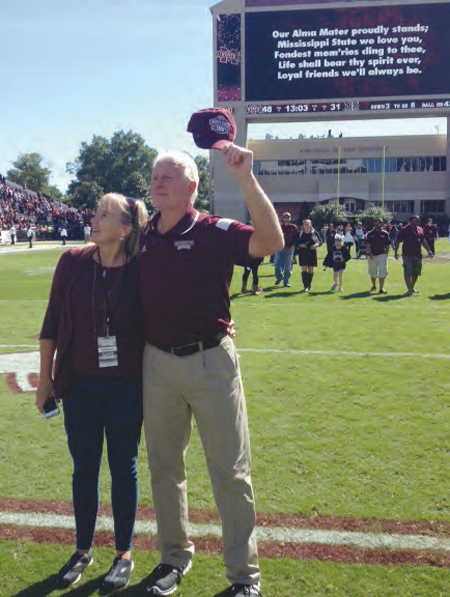
Papa and Mimi at a Bulldog On-Field Salute!
He is already thinking about how to increase diversity, to be known beyond a ministry to very white, very male, and very football-related individuals. He says 85 million kids play sports in the United States but only about 12 million play through a school-related team. The rest are AAU (Amateur Athletic Unions) or travel leagues, or community leagues. What a wide-open mission field that is!
One precious thing about the FCA ministry is indeed its heart for those gazillion men and women who are called “coach.” This is a ministry who recognizes the incredible influence that one person can have in the life of a player on whatever level. There are middle school and high school coaches who will never make it into the six or seven figure income bracket, but they can sometimes be the difference in a kid’s life.
But FCA also recognizes the pressures and the expectations that increase in a coach’s psyche at every notch on the ladder. The unique thing about FCA is its sensitivity and its outreach to coaches, their families, and those who play the sport.
Look for FCA to continue to be a profound influence in the lives of young and not so young in Mississippi. As Oscar Miskelly, an FCA board member said to me, “Bill and Mary have a passion for people from all walks of life and love helping them discover God’s plan for their lives. They are well prepared for this new assignment as they lead FCA Mississippi into the next phase of ministry.”
Be on the lookout because God will indeed be glorified. And our state will be better for it!